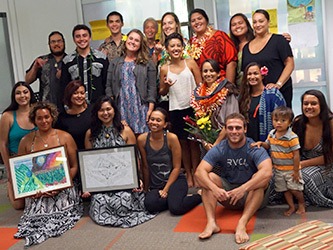In 2016, an inaugural cohort of undergraduate students successfully completed Nā Koʻokoʻo, a leadership program that is part of the College of Social Sciences’ Native Hawaiian Initiative. The program is rooted in Kanaka Maoli perspectives and led by Native Hawaiian faculty in the college. Through a series of two courses and two immersive community-engaged experiences with Hawaiian organizations, students learned how to meaningfully take their academic work beyond the university campus and to see themselves as emerging leaders who carry responsibilities to the ʻāina (land/water) and kānaka (people) of Hawaiʻi. By taking students outside of the classroom to work the land in partnership with communities who are already doing this work, they were introduced to ʻŌiwi frameworks of governance and diplomacy.
The Nā Koʻokoʻo cohort focused on issues of governance amidst climate change. The program began with a course in Contemporary Native Hawaiian Politics, coupled with a waʻa-training camp in partnership with the Kānehūnāmoku Voyaging Academy. While planning for their preferred futures in times when sea-levels will be rising, precipitation patterns changing and fossil fuels becoming more scarce and dangerous, students learned firsthand about how ancestral Hawaiian ways of traversing and relating to the ocean can be important pathways forward. They also critically examined the constitutional-drafting process that was taking place within the ʻAha 2016.
During summer session, Nā Koʻokoʻo participants spent a week at Keawanui fishpond on Molokaʻi as part of their Introduction to Indigenous Politics course. This partnership with Hui o Kuapā, a Molokaʻi-based non-profit focused on revitalizing traditional Hawaiian fishponds, allowed students to think about constituting Indigenous governance in expansive ways. They drafted written, visual and musical constitutions, reflecting shared values and innovative government designs, inspired by what they learned while in residence on Molokaʻi.
“I learned that I am integral in the ecosystem and my awareness of this system makes me a participant rather than just a leech. Too often I feel like I am not fully participating in my environment when I am living in the city. When I was living on the fishpond I could see how I was a part of the ecosystem because I was eating what I was growing and catching,” one student explained.
Another shared, “In the five days we spent there on Molokaʻi, I felt so connected to the land and aloha ʻāina as a whole. Although this type of work and experience may not be for everyone, it is for every Hawaiian. This type of living and this type of mindset CAN CHANGE THE WORLD.”
Through the Nā Koʻokoʻo program, Native Hawaiian students were provided with skills and abilities that allowed them to help their communities tackle pressing issues, while also earning six upper division credits and covering four general education focus designations as part of this community-engaged program. The 2016 inaugural cohort was led by Professor Noelani Goodyear-Kaʻōpua in Political Science, and the 2017 cohort will be led by Professor Ty Kāwika Tengan in Ethnic Studies.
The name of the new program comes from the word, “koʻokoʻo,” which can refer to a walking stick or staff that one uses to lean on as they walk. The program aims to build a support system for Native Hawaiian students and others who have commitments to Native Hawaiian communities, and it also aims to train them to become a new generation of koʻokoʻo, supporting their communities and supporting change. Reflecting on the program, one student stated, “There is so much that I can do to help my community and lāhui with the knowledge that am gaining in school and through these types of experiences.”
Through Nā Koʻokoʻo, students develop the skills and confidence to become community leaders. A koʻokoʻo can only provide such support by being planted firmly on the ground. Just like the koʻokoʻo, student participants learn that to be a pillar of community support, one needs to be firmly rooted in ʻāina and lāhui.
For more information, or to refer a potential student to this program, contact Professor Goodyear-Kaʻōpua at goodyear@hawaii.edu or Professor Tengan at ttengan@hawaii.edu. Visit the Nā Koʻokoʻo program online.
